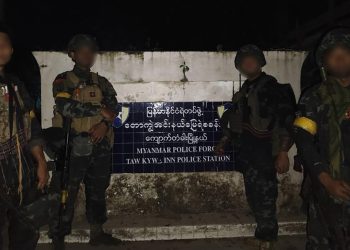NAYPYITAW — After military representatives to the national legislature complained to the Speaker of the Union Parliament about the parliamentary journalists, civilian lawmakers said they have had no issues with the journalists.
In the complaint dated Aug. 1, military representatives accused journalists of acting without responsibility or accountability by publishing news stories, photos and video clips about the activities of lawmakers. The complaint was accompanied by two photos, published by the European Press Agency and The Irrawaddy respectively, and four screenshots of video files published by Mizzima.
The unlawful acts of journalists cause annoyance and public nuisance, disturb the personal privacy and security of citizens and harm human dignity while misleading reports undermine the integrity of Parliament, said the complaint.
“What I can say is that I am not disturbed by the media at all,” said Lower House lawmaker Daw Su Su Lwin, the wife of former President U Htin Kyaw.
Another lawmaker Daw Khin San Hlaing also said that she had no hassle from journalists since she was elected to Parliament in 2012.
“Even if there was a misunderstanding, we could clear it up through negotiation. I’d say the media has not annoyed or frustrated me in all these years,” she told reporters.
Union Parliament Director-General U Kyaw Soe informed officials of the Myanmar Press Council during a meeting earlier this month about the complaint made by the military representatives. The military representatives, however, were not present at that meeting.
“Their statement is not clear. It didn’t mention which [action of journalists] violates which [law]. It seems that the [military representatives] are monitoring the personal [Facebook] accounts of journalists. Their complaint is perhaps in response to [negative comments] sometimes posted by journalists on their personal accounts,” said U Myint Kyaw, a member of the Myanmar Press Council.
No lawmaker or minister will be able to avoid criticism, said Lower House lawmaker U Aung Hlaing Win of Mingaladon Township, Yangon. Though elected civilian lawmakers can accept the criticism, it can be difficult for the appointed military representatives.
“We’ve been criticized a lot, and in some cases, were misquoted. [Military representatives] should try to bear these like a lawmaker,” he said.
Lower House Rights Committee Secretary U Hla Moe said journalists are just doing their jobs and they do not cause annoyance to lawmakers.
Lawmakers should welcome the media and not shut the door to it because it is a communication channel between lawmakers and the people, said lawmaker U Zarni Min from Shwegu Township in Kachin State.
“When you are in Parliament, it is impossible to avoid journalists. Parliament is not a meditation center. When you become a lawmaker, you have to listen to the voices of the people that are carried by the media,” said U Zarni Min.
In late July, Ko Min Min, a journalist from Mizzima Media was sworn at by military representative Maj-Gen Tin Swe Win, who directed obscene language at him. Video evidence of his outburst appeared in the media, along with reports of the military’s budget requests to the Union Parliament for the coming fiscal year.
“It is unacceptable that he responded like that just because some individuals write this and that about them on the social media. If they are not happy with something, they should point it out clearly. In their positions, it is not suitable for them to complain about all the journalists in Naypyitaw,” U Myint Kyaw told The Irrawaddy.
Journalist Ko Min Min filed a complaint with the Union Parliament and the group of military representatives. Military representatives also filed a complaint against Mizzima Media.
“I didn’t show disrespect and I only videoed within the designated area. His reaction had nothing to do with me,” said Ko Min Min.
On Wednesday, the Parliament distributed pamphlets outlining 18 points of discipline that parliamentary journalists should follow. The Irrawaddy was not able to obtain a comment from Director of Parliament U Maung Hmu.
The final point urges journalists, in reporting about parliamentary debates, to make their reports in line with journalistic ethics to ensure the report does not tarnish the image of the country and Parliament.
Translated from Burmese by Thet Ko Ko.

















